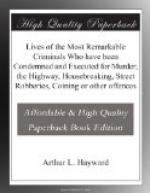However, Cluff was immediately apprehended, and at the ensuing sessions at the Old Bailey he was indicted for the murder of Mary Green, by giving her a mortal wound in the right thigh, of the breadth of one inch, and of the depth of five inches, of which she instantly died. He was a second time indicted upon the coroner’s inquest for the said offence, and also a third time upon the Statute of Stabbing. However the evidence not being clear enough to satisfy the jury, on his trial he was acquitted by them all. But this not at all satisfying the relations of the deceased Mary Green, her brother William Green brought an appeal against him, which is a kind of proceeding which has occasioned several popular errors to take rise. Therefore it may not be improper to say something concerning it for the better information of our readers.
Appeals are of two sorts, viz., such as are brought by an innocent person, and such as are brought by an offender confessing himself guilty, who is commonly called an approver. An innocent person’s appeal is the party’s private action, prosecuting also for the Crown, in respect of the offence against the public, and such a prosecution may be either by writ or by bill. As to the writ of appeal, it is an original issuing out of Chancery and remarkable in the Court of King’s Bench only. Bills of Appeal are more common and contain in them the nature both of a writ and a declaration, and they may be received by commissioners of gaol delivery or justices of assize.
Those which are in use at present in capital cases are four, viz., Appeals of Death, of Larceny, of Rape and of Arson. The first is both the most common and that of which we are particularly to speak. It is to be brought by the wife or heir of the person deceased, unless they be guilty of the murder, and then the heir may have an appeal against the wife, or if he be accused the next heir may have it against him. The appellant must be heir general to the deceased, and his heir male (for by Magna Charta a woman cannot have an appeal of death for any but her husband) and in the appeal also it must be set forth how the appellant is heir unto the deceased. As to the time in which an appeal may be brought, it is by the Statute of Gloucester[86] restrained within a year and a day from the time of the deed done. There is great nicety in all the proceedings on appeals of death and everything must be set forth with the greatest exactness imaginable. The appellant hath also the liberty of pleading as many pleas, or to speak more properly, to take issue on as many points as he thinks fit. He is tried by a jury, and on his being found guilty, the appellant hath an order for his execution settled by the Court; but when the appellee is acquitted, the appellant is chargeable with damages on such a prosecution, provided there appear to have been no just cause for the commencement thereof.




